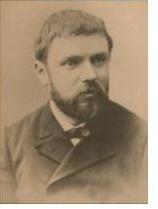Jules-Henri Poincaré
Mathematician, astronomer and philosopher; b. 29 April 1854 (Nancy, France), d. 17 July 1912 (Paris).
 Henri Poincaré came from a family of the upper class. His father Léon Poincaré was Professor of Medicine at the University of Nancy. His cousin Raymond Poincaré was prime minister of France several times and president of the French Republic during World War I. Other members of the family achieved high positions in administration and education.
Henri Poincaré came from a family of the upper class. His father Léon Poincaré was Professor of Medicine at the University of Nancy. His cousin Raymond Poincaré was prime minister of France several times and president of the French Republic during World War I. Other members of the family achieved high positions in administration and education.
These circumstances allowed the young Henri to receive a good education from his mother despite of a serious attack of diphtheria and poor muscular coordination. He entered the high school of Nancy (which is now called the Lycée Henri Poincaré) in 1862 and excelled in every topic and particularly in mathematics and won first prizes in national competitions.
Poincaré enrolled in the École Polytechnique in 1873 and graduated two years later. He continued his studies at the École des Mines and worked for a while as a mining engineer before receiving his PhD from the University of Paris in 1879 with a thesis on differential equations.
After a first appointment as mathematics lecturer at the University of Caen Poincaré joined the Faculty of Science of the University of Paris in 1881 and in 1886 was appointed to a chair of mathematical physics and probability and at the same time to a chair at the École Polytechnique. He held both chairs until his death. In his lectures he regularly covered optics, electricity, the equilibrium of fluid masses, the mathematics of electricity, astronomy, thermodynamics, light, and probability.
Poincaré is considered one of the great geniuses of all time and often described as the last universalist in mathematics. He made contributions to numerous branches of mathematics, celestial mechanics, fluid mechanics, the special theory of relativity, non-Euclidean geometry and the philosophy of science. When Oscar II, King of Sweden and Norway, initiated a mathematical competition in 1887 to celebrate his sixtieth birthday in 1889, Poincaré submitted a memoir on the three-body problem in celestial mechanics (an extremely difficult and still not completely solved problem relating to the movement of three bodies under gravity) and was awarded the prize.
Between 1892 and 1899 Poincaré published his major work on celestial mechanics Les Méthodes nouvelles de la mécanique céleste (The New Methods of Celestial Mechanics). He then went against the general intellectual climate of the times in which science was not much in the public eye by writing popular works on science and mathematics including "Science and Hypothesis" (1901), "The Value of Science" (1905) and "Science and Method" (1908).
Although Poincaré was held in high esteem as a mathematician he never had any graduate students. Others used his results but did not adopt his methods of investigation. He was elected to the Académie des Sciences in 1887 and became the only member elected all its five sections geometry, mechanics, physics, geography and navigation. He became president of the Academy in 1906. In 1908 he was elected to the Académie Française and became its director in the year of his death at the early age of 58.
An address at Poincaré's funeral described him as
- a mathematician, geometer, philosopher, and man of letters, who was a kind of poet of the infinite, a kind of bard of science.
His many interests and prominence in philosophical debate had made him a public figure early in his life. His thought processes became the subject of psychological investigation and were documented in a book published during his lifetime. Poincaré contributed to these studies himself, and reflection on the way of thinking can be found in his philosophical works.
Reference
O'Connor, J. J. and E. F. Robertson, Jules-Henri Poincaré.
http://www-gap.dcs.st-and.ac.uk/~history/Mathematicians/Poincare.html (accessed 23 September 2004).
home
 Henri Poincaré came from a family of the upper class. His father Léon Poincaré was Professor of Medicine at the University of Nancy. His cousin Raymond Poincaré was prime minister of France several times and president of the French Republic during World War I. Other members of the family achieved high positions in administration and education.
Henri Poincaré came from a family of the upper class. His father Léon Poincaré was Professor of Medicine at the University of Nancy. His cousin Raymond Poincaré was prime minister of France several times and president of the French Republic during World War I. Other members of the family achieved high positions in administration and education.